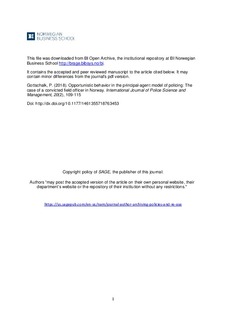Opportunistic behavior in the principal-agent model of policing: The case of a convicted field officer in Norway
Journal article, Peer reviewed
Accepted version
Permanent lenke
http://hdl.handle.net/11250/2502749Utgivelsesdato
2018Metadata
Vis full innførselSamlinger
- Publikasjoner fra CRIStin - BI [1015]
- Scientific articles [2181]
Originalversjon
International Journal of Police Science and Management. 2018, 20 (2), 109-115. http://dx.doi.org/10.1177/1461355718763453Sammendrag
Whereas the criminal justice system is designed to determine whether a police officer as an offender is guilty or innocent, the principal–agent model of policing can provide insights into police officer behavior in law enforcement. Agency theory suggests that the chief as a principal and the field officer as an agent may have different preferences, varying knowledge, and opposite risk willingness when it comes to policing. For example, goals may justify means. In this article, the case of a convicted police officer in Norway is discussed based on principal–agent theory.
